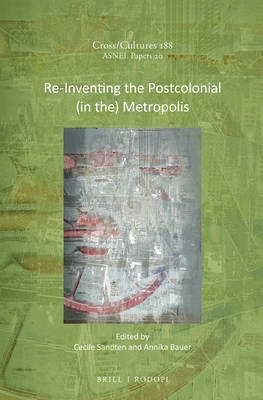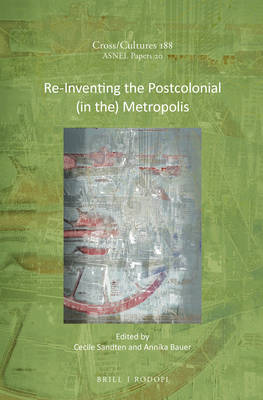
- Retrait gratuit dans votre magasin Club
- 7.000.000 titres dans notre catalogue
- Payer en toute sécurité
- Toujours un magasin près de chez vous
- Retrait gratuit dans votre magasin Club
- 7.000.0000 titres dans notre catalogue
- Payer en toute sécurité
- Toujours un magasin près de chez vous
Re-Inventing the Postcolonial (in The) Metropolis
296,45 €
+ 592 points
Description
The notion of the postcolonial metropolis has gained prominence in the last two decades both within and beyond postcolonial studies. Disciplines such as sociology and urban studies, however, have tended to focus on the economic inequalities, class disparities, and other structural and formative aspects of the postcolonial metropolises that are specific to Western conceptions of the city at large. It is only recently that the depiction of postcolonial metropolises has been addressed in the writings of Suketu Mehta, Chris Abani, Amit Chaudhuri, Salman Rushdie, Aravind Adiga, Helon Habila, Sefi Atta, and Zakes Mda, among others. Most of these works probe the urban specifics and physical and cultural topographies of postcolonial cities while highlighting their agential capacity to defy, appropriate, and abrogate the superimposition of theories of Western modernity and urbanism.
These ASNEL Papers are all concerned with the idea of the postcolonial (in the) metropolis from various disciplinary viewpoints, as drawn from a great range of cityscapes (spread out over five continents). The essays explore, on the one hand, ideas of spatial subdivision and inequality, political repression, social discrimination, economic exploitation, and cultural alienation, and, on the other, the possibility of transforming, reinventing and reconfigurating the 'postcolonial condition' in and through literary texts and visual narratives.
In this context, the volume covers a broad spectrum of theoretical and thematic approaches to postcolonial and metropolitan topographies and their depictions in writings from Australia and New Zealand, South Africa, South Asia, and greater Asia, as well as the UK, addressing issues such as modernity and market economies but also caste, class, and social and linguistic aspects. At the same time, they reflect on the postcolonial metropolis and postcolonialism in the metropolis by concentrating on an urban imaginary which turns on notions of spatial subdivision and inequality, political repression, social discrimination, economic exploitation, and cultural alienation - as the continuing 'postcolonial' condition.
These ASNEL Papers are all concerned with the idea of the postcolonial (in the) metropolis from various disciplinary viewpoints, as drawn from a great range of cityscapes (spread out over five continents). The essays explore, on the one hand, ideas of spatial subdivision and inequality, political repression, social discrimination, economic exploitation, and cultural alienation, and, on the other, the possibility of transforming, reinventing and reconfigurating the 'postcolonial condition' in and through literary texts and visual narratives.
In this context, the volume covers a broad spectrum of theoretical and thematic approaches to postcolonial and metropolitan topographies and their depictions in writings from Australia and New Zealand, South Africa, South Asia, and greater Asia, as well as the UK, addressing issues such as modernity and market economies but also caste, class, and social and linguistic aspects. At the same time, they reflect on the postcolonial metropolis and postcolonialism in the metropolis by concentrating on an urban imaginary which turns on notions of spatial subdivision and inequality, political repression, social discrimination, economic exploitation, and cultural alienation - as the continuing 'postcolonial' condition.
Spécifications
Parties prenantes
- Editeur:
Contenu
- Nombre de pages :
- 462
- Langue:
- Anglais
- Collection :
- Tome:
- n° 188
Caractéristiques
- EAN:
- 9789004322851
- Date de parution :
- 07-10-16
- Format:
- Livre relié
- Format numérique:
- Genaaid
- Dimensions :
- 152 mm x 236 mm
- Poids :
- 771 g

Les avis
Nous publions uniquement les avis qui respectent les conditions requises. Consultez nos conditions pour les avis.





